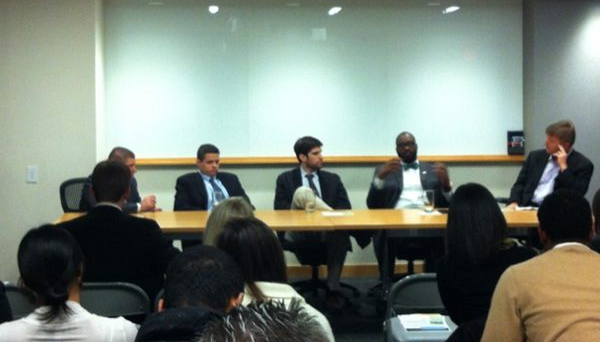As DC sports are on the rise (Redskins, Nationals, DC United and maybe the Wizards after Tuesday’s win over reigning champion, Miami Heat), the conversation around sports influence and social impact has become increasingly relevant. The past five years have witnessed the growth of social media which has only heightened these dialogues. Our team at Weber Shandwick decided to host a panel featuring thought leaders in the space to explore sports influence, social media and social impact.
Sports. Social media. Social impact.
Matt Winkler, Associate Dean of the Georgetown University Sports Industry Management Program moderated our #SportsImpact panel which showcased the following experts:
- Chad Williamson, Director of Philanthropy for Dhani Jones & CEO, BowTie Cause
- Mike Donnelly, Senior Communications Manager, Head of Social, NFLPA
- Chad Kurz, Director of New Media, Washington Nationals
- Joe Briggs, Public Policy Counsel, NFLPA
The event welcomed 50+ attendees observing and participating in the dynamic discussion. The agenda was broken down into three segments; 1) how leagues/teams are active and regulate social media, 2) how fans are engaging and interacting over social media, and 3) how social platforms are being used and can be used to facilitate social impact. The audience challenged panelists with questions that sparked debate around past, present and future opportunities to better capture sports influence in the social impact space. We hope this panel will be the first of many to bring awareness to this apparent gap in the industry.
Top Ten Takeaways from #SportsImpact Panel:
10. Players with a long term view can create and leverage an online audience to make a difference after football yet many do not. Chad Johnson, ex-NFL star, has near 4 million Twitter followers but has not taken advantage of his influence.
9. If you don’t control your message, somebody else will.
8. Players with huge potential in social impact space include RGIII, Arian Foster & international soccer stars such as Ronaldo, due to likeability, influence and leadership.
7. Not all leagues have the same approach in regulating social media. Rules and sanctions vary across leagues/teams. Operationally, the MLB is unique in which each team must work with the interactive online branch of the league, MLB Advanced Media, to update their respective websites.
6. ROI = Return on Influence/Impact
5. Implementing an integrated approach across channels to deliver a uniform message in vital. As the NFL lockout was nearing, the NFLPA bought nfllockout.com and properties on Facebook and Twitter to be the initial online point of contact and frame their message accordingly.
4. Social media is effective for connecting and spreading influence but traditional marketing tactics are still essential in building a brand and communicating effectively.
3. Players/leagues/teams/entities receive requests for retweets and mentions all the time. You don’t have to respond! It’s essential to keep accounts authentic and organic or else fans can tell.
2. Case Study of the Year: Brendon Ayanbadejo, Baltimore Ravens linebacker, and his advocacy behind marriage equality in Maryland.
1. Most athletes aren’t having the right conversation. Give back, social impact. Be a better person. A great deal of CSR opportunities exist across professional sports with thousands of present and past players that hold influence.
*This recap was also cross-posted on the Weber Shandwick Social Impact blog and the Powell Tate Insights blog.

